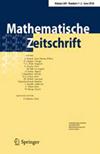具有 ISR 特性的无限可化群示例
IF 1
3区 数学
Q1 MATHEMATICS
引用次数: 0
摘要
设 G 是 \(S_{\mathbb {N}}\),是正整数集合 \(\mathbb {N}}\)上的有限置换(即具有有限支持的置换)群。我们证明了 G 具有阿姆鲁塔姆-蒋(Amrutam-Jiang)著作中提出的不变冯-诺依曼子布拉刚度(简称 ISR)属性。更准确地说,对于某个正常子群 (H\lhd G\ ),每个 G 不变的冯-诺依曼子代数 (P/subseteq L(G)\)都是 L(H) 的形式,在这种情况下:\(H=\{e\}, A_{\mathbb {N}}\) 或 G,其中 \(A_{\mathbb {N}}\) 表示 \(\mathbb {N}}\) 上的有限交替群,即.e.,S_{\mathbb {N}} 中所有偶数排列的子群。这给出了具有 ISR 特性的无限可调和群的第一个已知例子。本文章由计算机程序翻译,如有差异,请以英文原文为准。
An example of an infinite amenable group with the ISR property
Let G be \(S_{\mathbb {N}}\), the finitary permutation (i.e., permutations with finite support) group on the set of positive integers \(\mathbb {N}\). We prove that G has the invariant von Neumann subalgebras rigidity (ISR, for short) property as introduced in Amrutam–Jiang’s work. More precisely, every G-invariant von Neumann subalgebra \(P\subseteq L(G)\) is of the form L(H) for some normal subgroup \(H\lhd G\) and in this case, \(H=\{e\}, A_{\mathbb {N}}\) or G, where \(A_{\mathbb {N}}\) denotes the finitary alternating group on \(\mathbb {N}\), i.e., the subgroup of all even permutations in \(S_{\mathbb {N}}\). This gives the first known example of an infinite amenable group with the ISR property.
求助全文
通过发布文献求助,成功后即可免费获取论文全文。
去求助
来源期刊
CiteScore
1.60
自引率
0.00%
发文量
236
审稿时长
3-6 weeks
期刊介绍:
"Mathematische Zeitschrift" is devoted to pure and applied mathematics. Reviews, problems etc. will not be published.

 求助内容:
求助内容: 应助结果提醒方式:
应助结果提醒方式:


